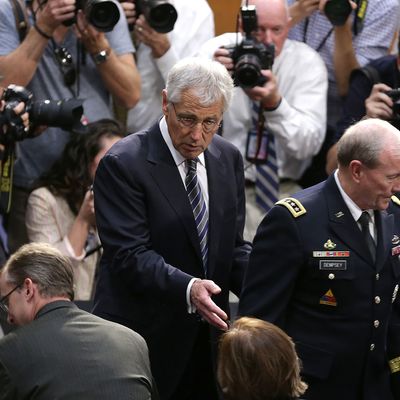
The case for air strikes in Syria is a rational (though far from clear-cut) application of humanitarian internationalism: The international norm against using chemical weapons is worth maintaining. But it’s a complicated argument, not to mention an unpopular one. Americans are war-weary and unreceptive to internationalist arguments centered on protecting nameless civilians in godforsaken backwaters. So the Obama administration is augmenting its sensible humanitarian arguments with mindless security arguments.
In his prepared remarks, Chuck Hagel offered up the kind of self-interested defense of intervention that would appeal to a “realist” like himself:
If Assad is prepared to use chemical weapons against his own people, we have to be concerned that terrorist groups like Hezbollah, which has forces in Syria supporting the Assad regime, could acquire them. This risk of chemical weapons proliferation poses a direct threat to our friends and partners, and to U.S. personnel in the region. We cannot afford for Hezbollah or any terrorist group determined to strike the United States to have incentives to acquire or use chemical weapons.
This starts off making no sense and then manages to make even less sense as it goes on.
Begin with the first sentence. Why would Bashar al-Assad’s willingness to use chemical weapons against his own people indicate a willingness to give those weapons to Hezbollah? He’s using the weapons because he wants to stay in power and is sociopathic enough to deploy whatever ends necessary to advance that goal. He might decide to give some chemical weapons to Hezbollah, but using them against his own people has nothing to do with a decision like that.
In his next sentence, Hagel invokes the “risk of chemical weapons proliferation.” But we have no plan to stop chemical-weapons proliferation. Chemical weapons, unlike nuclear weapons, are easy to manufacture. They don’t require extremely rare materials and technical capacity. We don’t even have a plausible strategy to destroy Assad’s currently existing chemical-weapons stockpile.
Building on the implausible premises in his first two sentences, Hagel arrives at his final, ominous warning: “We cannot afford for Hezbollah or any terrorist group determined to strike the United States to have incentives to acquire or use chemical weapons.” By this point, Hagel has descended into a word salad of scaremongering. If Hezbollah is “determined to strike the United States,” then what’s stopping them? How would our failure to bomb Assad alter the equation in such a way as to make a chemical attack against the United States more likely?
Indeed, the logic of national self-defense actually points in the opposite direction. The most fanatically anti-American organization is Al Qaeda, which is slowly gaining power among the anti-Assad rebels. Striking Assad increases the risk that Al Qaeda will gain control of Assad’s chemical weaponry and use it against an American target. Now that, too, strikes me as a highly unlikely contingency. But it’s at least possible to imagine how and why A would lead to B and then C. Hagel’s scare story doesn’t even track.
An oft-repeated liberal critique of the Bush administration, formulated by Daniel Davies, was that “Good ideas do not need lots of lies told about them in order to gain public acceptance.” I don’t actually agree with that as a hard and fast rule. Sometimes Americans oppose good ideas. (That’s why, for instance, Democrats prefer to defend climate policy as a self-interested stimulus for “green jobs” rather than as a benevolent contribution to the future of humanity.) But the administration’s willingness to stoop to demagogic national-security rationales certainly makes me more suspicious, on the margins, of the merits of the policy itself. Syria may not be Iraq, but the spectacle of administration figures peddling dubious rationales for war is a discomfiting throwback to a decade ago.






























